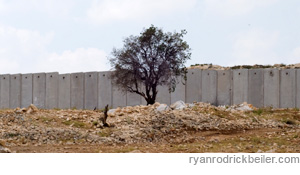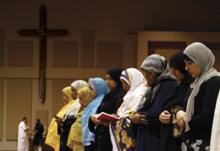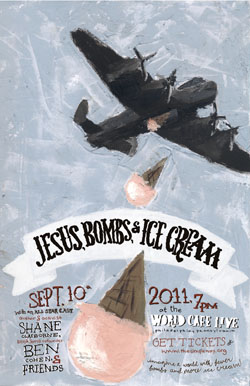A Tennessee church welcomes its Muslim neighbors.
Peace and Nonviolence
Recent analyses of the Arab Spring have questioned the efficacy of nonviolent resistance compared to armed struggle in ousting authoritarian regimes. The relatively expeditious victories of the nonviolent uprisings (not "revolutions," as some suggest) in Tunisia and Egypt stand in stark contrast to Libya, where a disparate amalgam of armed groups, guided politically by the Libyan Transitional National Council (TNC) and backed militarily by NATO, are on the verge of removing Moammar Gadhafi from power. As someone who has written extensively about civil resistance, notably in the Middle East, while at the same time working on the Libya portfolio within the State Department, I've been grappling with the meaning and significance of the Libyan revolution and its possible impact on the region.
First of all, like most people, including my State Department colleagues, as well as democrats and freedom fighters around the world, I am delighted that an especially odious and delusional Libyan dictator is getting the boot. I applaud the bravery and determination of the Libyan people, who have endured four decades of a despicable dictatorship and have made great sacrifices to arrive at this point. I hail the extensive planning that my U.S. government colleagues have undertaken over the past five months, in concert with Libyan and international partners, to support a post-Gadhafi transition process.
The forthcoming dedication of the national memorial monument honoring Rev. Dr. Martin Luther King, Jr., affords an opening for considering the complexity and meaning of his leadership. He was not the tamed and desiccated civil hero as often portrayed in the United States around the time of his birthday, celebrated as a national holiday. He was until the moment of his death raising issues that challenged the conventional wisdom on poverty and racism, but also concerning war and peace.
King was in St. Joseph's Infirmary, Atlanta, for exhaustion and a viral infection when it was reported that he would receive the 1964 Nobel Peace Prize. As Gary M. Pomerantz writes in Where Peachtree Meets Sweet Auburn, this was the apparent cost exacted by intelligence surveillance efforts and the pressures of learning that Attorney General Robert F. Kennedy had formally approved wiretaps by the Federal Bureau of Investigation. His evolving strength as a leader is revealed in his remarks in Norway that December, which linked the nonviolent struggle of the U.S. civil rights movement to the entire planet's need for disarmament.
On the morning of September 11, 2001, I was standing in the bathroom of my apartment outside Chicago, about to hop in the shower, when I heard the phone ring and then my husband call my name.
"It's Roger from the desk," he called, sleepily, invoking the name of the morning assignment editor at the Chicago Sun-Times where I was a reporter at the time.
I padded down the hallway in my pajamas to the living room and picked up the phone.
"How quickly can you get down here," Roger asked.
"I dunno, an hour, maybe," I said. "Why? What's up?"
"A plane hit the World Trade Center in New York," he said. "They think it's a terrorist attack."
Could nonviolent resistance have succeeded in Libya? Here are four points worth considering:
1) The movement was fairly spontaneous, unlike the highly coordinated campaign in Egypt. As Peter Ackerman consistently points out, planning is an essential element to a successful nonviolent revolution. As with any battlefield, a nonviolent campaign requires extensive preparation. But reports seem to indicate that Libyans began protesting in earnest around Feburary 15th, likely inspired by events in neighboring Egypt and Tunisia. Gadhafi seemed prepared for this and immediately cracked down using overwhelming violence. By February 19th, the movement had become violent in response to these crackdowns. Four days of civil resistance doesn't give it much time to work. Egyptian pro-democracy activists struggled for years before seeing Mubarak fall. Syrian oppositionists, thousands of whom have been killed by Bashar al-Assad's regime, have toiled along for the past six months. So, we can't really say whether or not nonviolence would have worked in Libya. It never had a chance to materialize in the first place.
The recent British film In Our Name is a returning-soldier drama featuring a married woman, Suzy, who leaves her husband and little girl to fight in Iraq. Because she's involved in the killing of a little girl during her tour-this part is based on a true story, but it happened to a man -- she returns home only to steadily fall apart under the stress of soul-destroying anxieties.
The rioting and rampages that spread across English cities last week have caused severe property destruction and raised public alarm. Writing in London's Guardian, community organizer Stafford Scott describes how he was among the group that on August 6 sought information from the police in Tottenham, a poorer section of London. They wanted an official statement on whether Mark Duggan had been killed by police bullets, as had been reported in the news.
All we really wanted was an explanation of what was going on. We needed to hear directly from the police. We waited for hours outside the station for a senior officer to speak with the family, in a demonstration led by young women. A woman-only delegation went into the station, as we wanted to ensure that this did not become confrontational. It was when the young women, many with children, decided to call it a day that the atmosphere changed, and guys in the crowd started to voice and then act out their frustrations.
This event is what most media accounts have identified as the spark that set England on fire, which has caught the world by surprise. Yet, says Scott, "If the rioting was a surprise, people weren't looking."
Many people remember "O God, Our Words Cannot Express," a hymn written on the afternoon of September 11, 2001. The hymn was quickly shared by email and Web postings (it is still on over 10,000 websites); it was used by many churches on that evening and in the days that followed. The hymn was featured in newspaper stories, radio programs, twice on national PBS-TV, and on BBC-TV in the United Kingdom. YouTube has the Church World Service music video by Emmy winner Pete Staman of this hymn being sung by Noel Paul Stookey (of "Peter, Paul & Mary") with the Northfield Mount Herman School Choir.
The new posting of this interfaith hymn includes a revised version for the 10th anniversary. Also included is "God, We've Known Such Grief and Anger", a hymn lifting up Christian hope in the face of disaster that was written for the first year anniversary of 9/11. Last week I wrote a new hymn for the tenth anniversary of September 11 with an emphasis on working for peace and justice for all.
On Monday the Dow Jones industrial average fell 634.76 points; the sixth-worst point decline for the Dow in the last 112 years and the worst drop since December 2008. Every stock in the Standard and Poor's 500 index declined.
It is easy to blame bipartisan bickering for the impasse that led to Standard and Poor's downgrading of the American debt, and in turn the vertiginous fall of the Dow. This bickering -- this substitution of ideology for reason, of egotism for compassion and responsibility on the part of lawmakers -- is a national disgrace; but while it failed to fix the problem, we must realize that it did not cause it. The cause -- and potential for a significant renewal -- lies much deeper.
So let's allow ourselves to ask a fundamental question: what's an economy for?
When I first visited Ethiopia at the height of the 1984 famine, I watched as twenty-four people died of starvation in less than fifteen minutes, right in front of my eyes. Barely five years into my career as a Congressman, nothing my staff told me beforehand could have prepared me for what I saw on that trip.
Gasping at awful photographs of unspeakable human suffering is one thing; bearing firsthand witness to human suffering is another thing entirely. Glancing at a picture of a starving child in the newspaper, you can always turn away, but when you're staring into the eyes of a mother who has just lost that child, it's a completely different story. There's no looking the other way.
That's why I often describe those first Ethiopia experiences as my "converting ground" on issues of global hunger. What happened in Ethiopia changed me, and changed how an entire generation looks at hunger.
It's also why I'm currently back on the Horn of Africa, reporting on the ground from the Dadaab refugee camp in eastern Kenya, less than fifty miles from the Somali border. And I am appealing to my affluent brothers and sisters in the United Stated and around the world not to look away. We need your help.
I hate war. I do not hate it because people die. Death is inescapable. And believers believe that we will meet those we love again in heaven. I hate war with a perfect hatred because it causes suffering and robs the world of incalculable human possibilities. It pains the earth. It creates waste and the misallocation of resources.
Saturday, August 6, 30 Americans and eight Afghans were killed when Taliban insurgents shot down a Chinook transport helicopter. The New York Times called it: "the deadliest day for American forces in the nearly decade-long war in Afghanistan."
 An account in The New York Times by Ethan Bronner reports that Israeli women and West Bank Palestinian women and girls have once again broken Israeli laws. They have gone swimming in the Mediterranean Sea.
An account in The New York Times by Ethan Bronner reports that Israeli women and West Bank Palestinian women and girls have once again broken Israeli laws. They have gone swimming in the Mediterranean Sea.
More than two dozen Israeli women invited Palestinian women and girls from the southern part of the West Bank of the Jordan River -- who are not normally allowed into Israel and have no access to the sea -- to go swimming with them. Under Israeli military occupation since 1967, according to Bronner, "most had never seen the sea before."
 Whenever I give talks on the effects of the Israeli occupation on Palestinian livelihood, the status of nonviolence as a means to resisting the occupation, and how I believe nonviolence is the only way to move forward to resolve the conflict and create a lasting peace between Israelis and Palestinians, one of the first and immediate questions I get from foreign visitors to my office in Bethlehem is, What you said is good, but what about the Muslims? Do they also believe in nonviolence? Do they understand it?" Even if I don't mention religion in my presentation -- and I rarely do -- this question always seems to make its way in our discussions.
Whenever I give talks on the effects of the Israeli occupation on Palestinian livelihood, the status of nonviolence as a means to resisting the occupation, and how I believe nonviolence is the only way to move forward to resolve the conflict and create a lasting peace between Israelis and Palestinians, one of the first and immediate questions I get from foreign visitors to my office in Bethlehem is, What you said is good, but what about the Muslims? Do they also believe in nonviolence? Do they understand it?" Even if I don't mention religion in my presentation -- and I rarely do -- this question always seems to make its way in our discussions.
Hidden Battles is a 65-minute documentary which follows a female Sandinista rebel, an Israeli officer, a Palestinian freedom fighter, and two American soldiers as they come to terms with their combat experiences. The film offers unique insight and hope into the internal conflicts that human beings around the world continue to face long after they have left the battlefield.
The documentary listens to the stories of these former soldiers as they reconcile what it means to have killed another human. A Vietnam veteran recalls that when he first killed, he was gripped by the feeling that he "did something -- literally against God." Watch this film and see how these veterans have fought to overcome. Each soldier deals with killing in his or her own unique way. Hidden Battles shows five ways in which this act is integrated into five different lives. Ultimately these stories testify to the resilience of the human spirit and hopefulness for the future.
I prefer my revolutions to be simple: A corrupt dictator/tyrant, an oppressed population, inspired reformers who risk their lives, calls for democracy, waves of marchers in the streets, background music from Les Misérables. The stories from Tunis and Cairo were epochal. The Arab spring was in full bloom as calls for participatory government could be heard from every corner of the Middle East.
Then there was Syria. The Assad government has been infamous in its intolerance to dissent. It is a military regime whose 30-year leadership under Hafez al-Assad (1930-2000) established it as one of the most severe in the region. In 2,000, after the death of Hafez, the world was intrigued to see his second son -- Bashar al-Assad -- ascend the throne. Bashar was an ophthalmologist who had studied in London, but because of his older brother's death in a car accident in 1994, he was called to follow his father. Bashar speaks English and French fluently and has been as critical of the U.S. as he has been of Israel.

Around the world, religious freedom is under threat -- but people of faith continue to reach across divides.
So now we know why over the past few years our Internet service would sometimes slow to a crawl: Osama bin Laden was tying up the circuits Googling himself. Repeatedly.
David Cortright's "Finding the Way Out" (March 2011), about why it's time to end the war in Afghanistan, was excellent and timely with one exception -- his appeal to the just war doctrine.
Hiroshima and Fukushima remind us that civilian and military nuclear technology go hand in hand.

